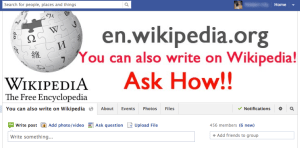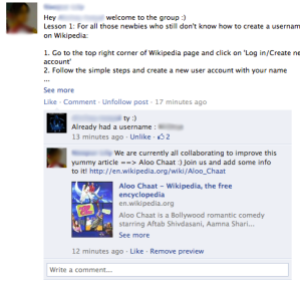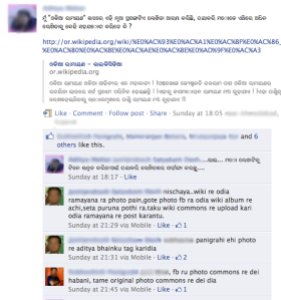
Social media is part of our reality. It is estimated that in India alone, the current number of 2 million Indians on social networking sites will grow by a factor of 36 in the next three years. Social media outreach can be a powerful tool, if used prudently, and we decided apply it to the task of encouraging Wikipedia participation in India.
The India Program started a pilot in March to using social media for outreach – and the initial indicators are encouraging. The seed for this was sown when we tried to stay in touch with the hundreds of people who had attended various outreach sessions across the country since January 2012. We sent them email or talk page messages offering help, but got only a handful of responses. But when we asked them if they’d like to join a Facebook group, the response was tremendous – and the “You Can Edit Wikipedia” page on Facebook now has 400 members.
Historically, “physical” outreach has been the primary mode of Wikipedia outreach, but it requires more time and effort on the part of existing editors, such as when they go to colleges or meetups and tell interested people about Wikipedia. Social media outreach requires significantly lower volunteer time and effort, and offers much more flexibility.

After talking to existing editors who were active in outreach or on social media as well as observing community Facebook groups, we identified tips on how this initiative could be best conducted. This was fleshed out into a 20 point guide, intended to provide structure in what can be a chaotic environment.
It suggests to get new editors to complete 5 basic tasks: create a user page, correct a spelling mistake, add a reference, improve content and leave a talk page message. All this is done using articles about a “fun” topic, based on existing policies but explaining them in simple terms.
So, what are the learnings reflected in this guide? Earlier, for most community Facebook groups, members would post links to articles they edited or images they added without an explanation or a call to action. Members were informing things but weren’t asking questions. Similarly, there was very little interaction between experienced and new editors. The activity on the group was irregular.
We encouraged Odia language editors on the Odia facebook group to post more frequently, structure their posts with questions, and choose “fun” articles that could interest many. The result was impressive. For example, within a week of focused messaging, a new user offered to help on an article on ‘Handia’, a local beverage. Since then, she has been adding images, creating articles on Odia cuisine and more! In the past few weeks, more than 15 new editors have made their first edits directly as a result of this hand-holding approach.

Our English group on Facebook has 400+ members only, to keep it manageable. We add users who have expressed their interest in a particular local language or had attended physical Wikipedia outreach events before. That explains why it works better than unstructured outreach (e.g. inviting users randomly to ‘like’ pages).
We are still learning new things about social media and outreach. Once a potential new editor expresses interest to learn more about editing, it is essential to give them personal attention. We’ve seen that the first 10 minutes are critical to get them to make their first 5 (basic) edits with simple and clear instructions. We also think it is important that experienced editors mentor the new editors.
When choosing articles to work on – we keep it fun! Sometimes it’s a stub on a local delicacy, or a start class article on a colorful politician or a hit television show. For instance, on the occasion of the World Environment Day on June 4, we posted and edited the article on Thimmamma Marrimaanu, the world’s largest Banyan tree. And on the day after a cricket series, users focused on the article Manvinder Bisla, the man of the match. We do regular editing hours on this group and post one article every day – and invite new editors to try their hand.
We celebrate new edits warmly to make editors realize their contribution is global, live and it counts.
Here’s a bunch of things we have learned not to do.
• We try to avoid jargon, teaching newbies about basic Wikipedias policies in a language that is as simple as possible.
• We try to not be intolerant of mistakes – as new editors will stumble, like all of us did (and still do!).
• We try to stay away from formal tones – since the thing they love about Facebook is the friendly atmosphere.
• We try to resist the temptation of reverting edits without telling them their mistakes, and giving them a chance to correct it themselves.
• We strongly discourage abusive language, intruding a user’s privacy and any form of harassment, intended or otherwise.
What’s the way forward then?
Building and keeping momentum with regular posts and updates, and engaging in conversations is crucial to a social media group. The charm of these services is their spontaneity, immediacy and the ‘live’ experience.
Our immediate priority is to get the nearly 50 editors who have done their first basic edits to stay with us and remain active to edit based on their interests.
In the meantime, stay tuned to this channel because the community have asked to support similar initiatives in Kannada, Assamese and Hindi! Also, to discuss and implement this pilot on your own Wikipedia group, you can write to me at noopur@wikimedia.org!
Noopur Raval, Consultant (Communications), India Program

Can you help us translate this article?
In order for this article to reach as many people as possible we would like your help. Can you translate this article to get the message out?
Start translation